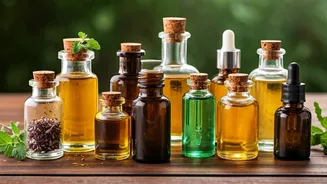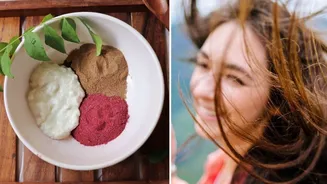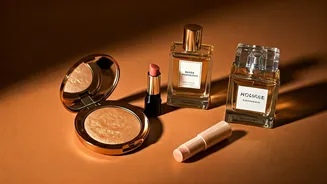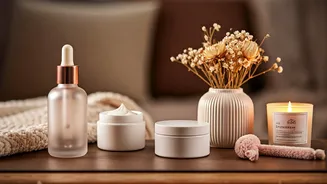Argan Oil: The Treasure
Argan oil, often hailed as 'liquid gold,' is a versatile choice for Indian hair. This oil is extracted from the kernels of the argan tree, primarily found
in Morocco, and it's rich in vitamin E, antioxidants, and essential fatty acids. These elements work in tandem to nourish the scalp, hydrate the hair strands, and promote shine. Argan oil is particularly effective at taming frizz and reducing split ends, making it ideal for those with dry or damaged hair. It absorbs quickly without leaving a greasy residue, making it suitable for daily use. Regular application can lead to softer, smoother, and more manageable hair, contributing to overall hair health and vitality. Furthermore, it helps protect hair from heat styling and environmental damage.
Coconut Oil: The Classic
Coconut oil remains a staple in Indian hair care routines, and for good reason. Extracted from the kernel or meat of mature coconuts, this oil is renowned for its moisturizing properties and ability to penetrate the hair shaft. It is rich in lauric acid, which gives it a high affinity for hair proteins, preventing protein loss. Coconut oil effectively reduces protein loss from hair, which makes the hair stronger. Applying coconut oil regularly can improve hair elasticity and reduce breakage. It also has antifungal and antibacterial properties, which can help in maintaining a healthy scalp. Its versatility extends to its ease of use; it can be used as a pre-wash treatment, a leave-in conditioner, or a styling product. For best results, warm the oil slightly before application to enhance absorption.
Amla Oil: The Ayurvedic Powerhouse
Amla oil, derived from the Indian gooseberry (amla) fruit, holds a revered position in Ayurvedic traditions. It is celebrated for its ability to promote hair growth, strengthen hair follicles, and combat premature graying. Amla is packed with vitamin C, antioxidants, and tannins, which protect the hair from environmental damage and free radicals. Regular use of amla oil can stimulate the scalp, promoting blood circulation that nourishes hair follicles. It helps in reducing dandruff and maintaining a healthy scalp environment. Using amla oil regularly strengthens the hair from the roots and makes them healthy. Its use contributes to thicker, healthier hair, and reduces the risk of hair thinning and loss, making it a powerful choice for those looking to improve hair health from within.
Castor Oil: The Growth Booster
Castor oil is a thick, viscous oil extracted from castor beans, widely recognized for its hair growth-promoting properties. It is rich in ricinoleic acid, which helps improve blood circulation to the scalp, thus fostering hair growth. Castor oil also contains omega-6 fatty acids, vitamin E, and proteins that nourish the hair. Regular application can stimulate hair follicles, leading to thicker, stronger hair, and helping to address hair loss issues. Its moisturizing qualities make it excellent for combating dryness and improving hair texture. Castor oil is especially beneficial for those with thinning hair or those seeking to boost hair growth in specific areas, such as eyebrows and eyelashes. Because of its thickness, it’s best used as a pre-wash treatment or mixed with a lighter oil to enhance application.
Almond Oil: The Nourisher
Almond oil, extracted from sweet almonds, is a gentle yet effective oil for nourishing and softening hair. It is rich in vitamin E, monounsaturated fatty acids, proteins, and minerals like magnesium, all essential for hair health. Almond oil has lightweight properties, making it a great choice for all hair types, including fine hair, without weighing it down. It effectively hydrates the hair, reducing dryness and enhancing shine. Regular application can strengthen the hair strands, preventing breakage, and improving overall elasticity. Almond oil is also beneficial for soothing an irritated scalp and promoting healthy hair growth. Its versatility allows it to be used as a leave-in conditioner or a pre-shampoo treatment, offering long-lasting hydration and protection.
Jojoba Oil: The Balancer
Jojoba oil, unlike other oils, is technically a wax ester that closely resembles the sebum naturally produced by the human scalp. This similarity makes it an exceptional choice for balancing oil production, thus preventing both dryness and greasiness. It's rich in vitamins and minerals like vitamin E, vitamin B, zinc, and copper, which work synergistically to maintain a healthy scalp and hair. Jojoba oil is non-greasy and easily absorbed, making it suitable for all hair types. It acts as a great moisturizer, improving shine and reducing frizz without weighing the hair down. It can also help unclog hair follicles, reducing dandruff and promoting healthier hair growth. Regular use of jojoba oil can improve hair's elasticity, strength, and overall manageability, making it a versatile addition to any hair care routine.
Sesame Oil: The Healer
Sesame oil, a staple in Ayurvedic medicine, is extracted from sesame seeds and is renowned for its healing properties. It is packed with vitamin E, vitamin B complex, and minerals like calcium, magnesium, and phosphorus, which contribute to hair health. Sesame oil has potent anti-inflammatory and antioxidant properties, which can help soothe an irritated scalp and protect against environmental damage. This oil also helps in preventing premature graying of hair by maintaining natural hair color. It is effective in promoting hair growth, strengthening the hair, and reducing hair fall. Regular use helps in improving blood circulation to the scalp, leading to healthier, stronger hair. In addition, its warm, soothing qualities make it a popular choice for scalp massages, promoting relaxation and well-being.
Mustard Oil: The Stimulator
Mustard oil, extracted from mustard seeds, is a traditional Indian hair oil known for its stimulating properties. It is rich in omega-3 fatty acids, vitamin E, and antioxidants, which contribute to hair health. Mustard oil boosts blood circulation to the scalp, encouraging hair growth and reducing hair fall. Its antimicrobial properties also help in combating dandruff and maintaining a healthy scalp. Regular application strengthens the hair follicles, leading to thicker and stronger hair strands. While it has a distinct smell that may not appeal to everyone, its effectiveness in promoting hair growth and improving hair texture makes it a valuable addition to hair care routines. Those with sensitive skin may want to do a patch test before regular use to ensure no adverse reactions.
Olive Oil: The Conditioner
Olive oil, a Mediterranean staple, also offers significant benefits for Indian hair. It is rich in monounsaturated fatty acids, antioxidants, and vitamins E and K. Olive oil is an excellent moisturizer, deeply conditioning the hair and reducing dryness and frizz. Its antioxidants protect the hair from damage caused by free radicals and environmental stressors. Regular use can improve hair elasticity, reduce breakage, and promote shine. Olive oil is particularly beneficial for dry, coarse, or damaged hair, providing deep hydration and restoring the hair's natural luster. It can be used as a pre-shampoo treatment, leave-in conditioner, or styling aid. Its versatility and effectiveness make it a go-to choice for those seeking to enhance hair health and manageability naturally.
Tea Tree Oil: The Clarifier
Tea tree oil, though not typically used alone, is a valuable addition to hair care due to its potent antifungal and antibacterial properties. It helps to unclog hair follicles, reduce dandruff, and promote a healthy scalp environment. Tea tree oil is particularly useful for those struggling with scalp conditions like seborrheic dermatitis or dandruff, because it helps in soothing inflammation and preventing itchiness. While tea tree oil should always be diluted, usually with a carrier oil like coconut or jojoba, its use can significantly improve the overall health of the scalp and hair. It can enhance the effectiveness of other hair oils when added in small amounts, making it a great supplement for a comprehensive hair care routine. Always perform a patch test to avoid any potential allergic reactions.














